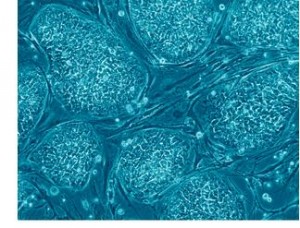WEDNESDAY, 25 MAY 2011
 Induced pluripotent stem cells are reprogrammed to an embryonic stem cell-like state to grow into many other cell varieties, and may be used for the generation of tissues for the treatment of diabetes and other diseases [1]. Dr Yang Xu and his colleagues at the University of California, San Diego transplanted embryonic and induced pluripotent stem cells into mice with the same genetic make-up as those used to make the source cells. While the embryonic stem cells formed teratomas, tumours containing a mixture of cell types that are used to confirm cell pluripotency, most of the induced pluripotent cells failed to form teratomas or grew into tumours that were rejected by the mouse [2].
Induced pluripotent stem cells are reprogrammed to an embryonic stem cell-like state to grow into many other cell varieties, and may be used for the generation of tissues for the treatment of diabetes and other diseases [1]. Dr Yang Xu and his colleagues at the University of California, San Diego transplanted embryonic and induced pluripotent stem cells into mice with the same genetic make-up as those used to make the source cells. While the embryonic stem cells formed teratomas, tumours containing a mixture of cell types that are used to confirm cell pluripotency, most of the induced pluripotent cells failed to form teratomas or grew into tumours that were rejected by the mouse [2].This suggests that, if cells are taken from a human and used to generate induced pluripotent stem cells, the patient’s immune system may reject them upon transplantation. However, the result reported by Xu may unnecessarily cast a shadow on the use of stem cells in therapy: the cells proposed for use in clinical situations would be differentiated into a specific cell type before being transplanted into immune-suppressed patients, and it is not known if the immune response observed is specific to the transplantation of undifferentiated cells [3].
Written by Robert Jones
Ed: This paper has caused a lot of controversy within stem cell biology. Researchers are concerned that iPS cells may lose public support as has previosuly occured with embryonic stem cells. The vast potential of iPS cells means that public hostility could severely inhibit the development of a broad spectrum of new highly effective medical treatments.
Key issues include the suggestion that the cells used may not be iPS cells and the results of implantation were assessed through indirect methods. Furthermore only one lab rat strain was studied, so findings may not apply to other rats, let alone Humans. As mentioned, iPS cells are not meant to be transplanted into a host, they are an intermediate stage in generating healthy adult tissue for transplantation. Hence study of iPS implantation is mostly irrelevant to major medical applications.
